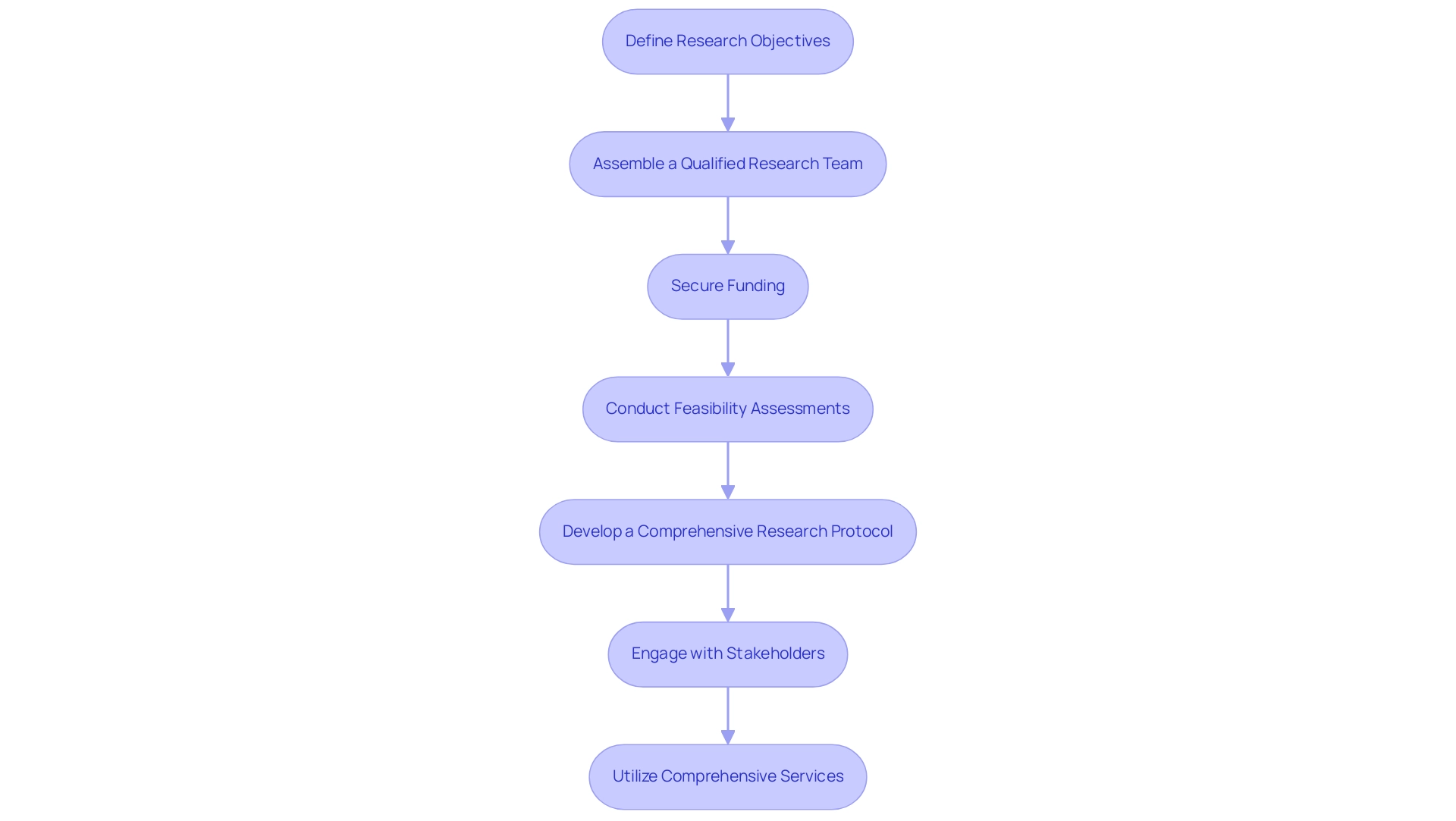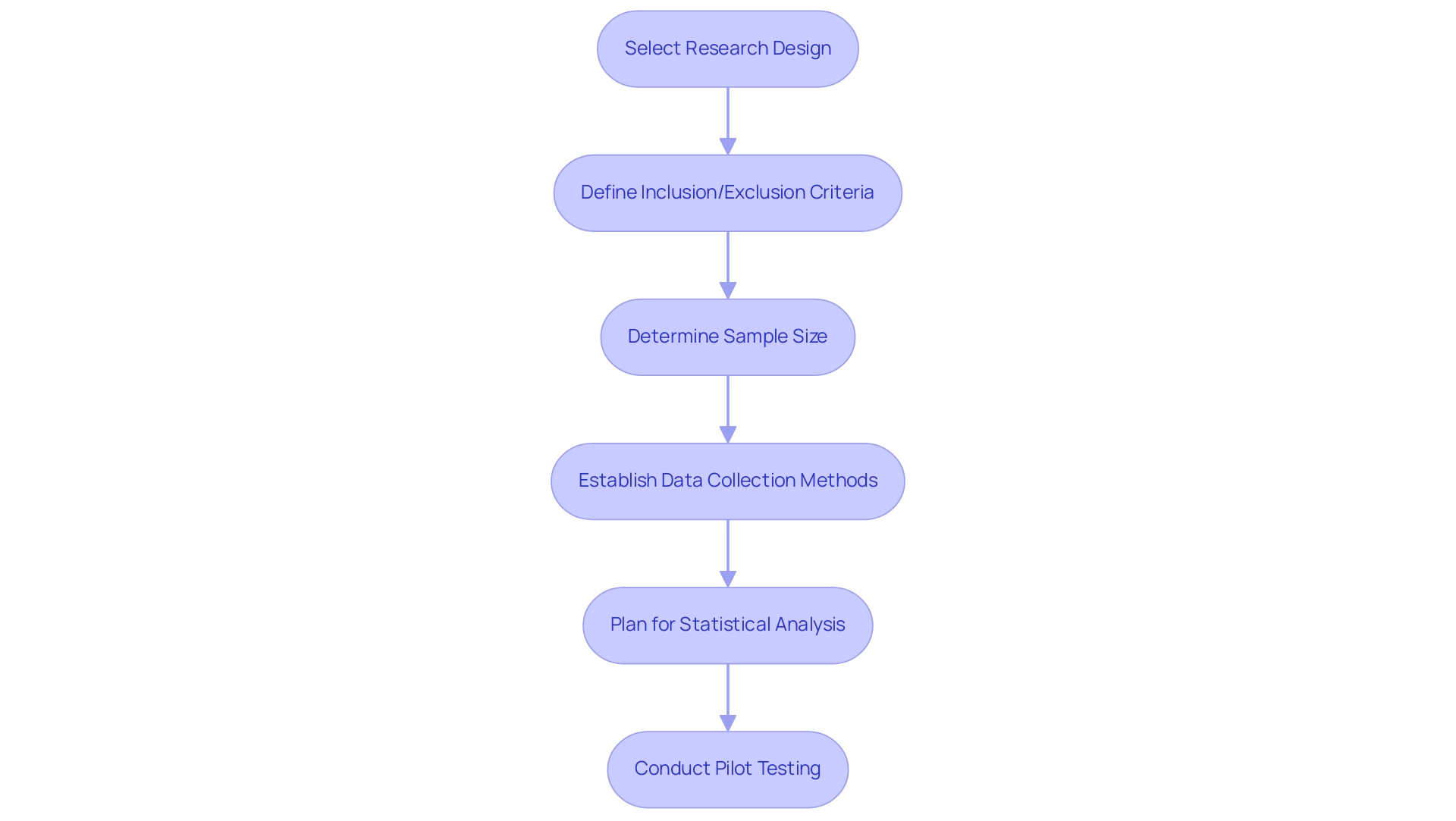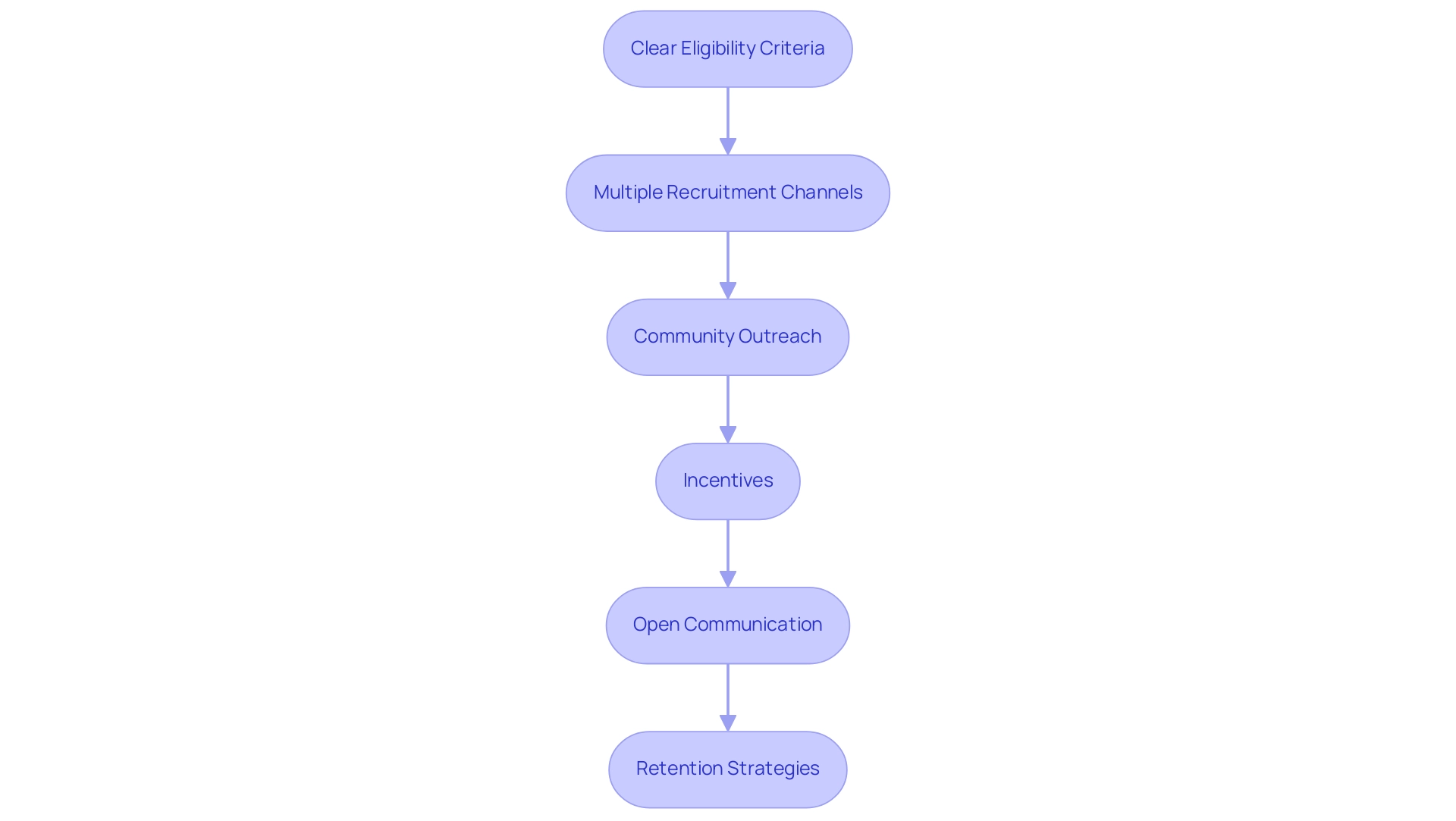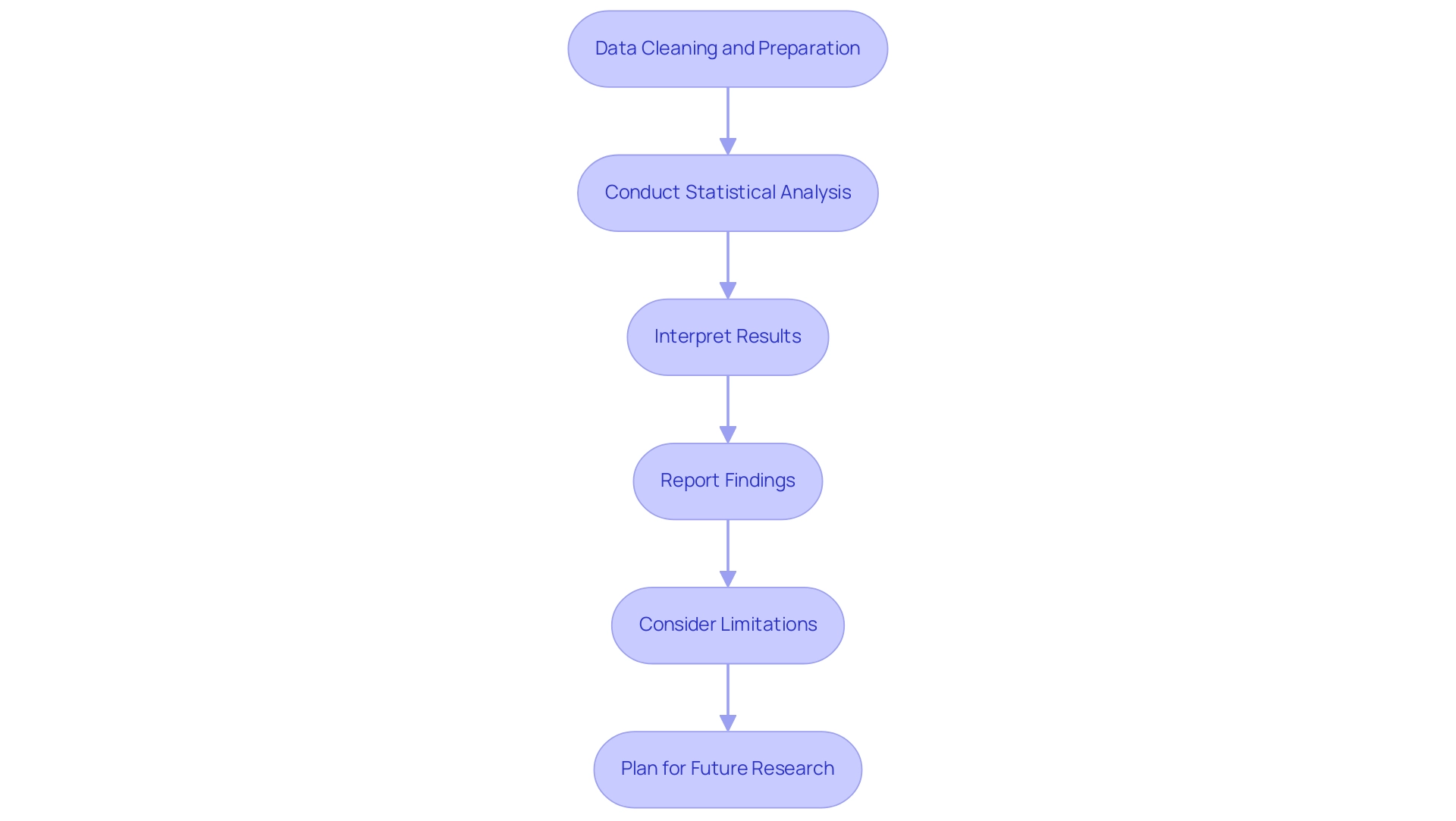Introduction
In Brazil, the landscape of clinical research is rapidly evolving, presenting both opportunities and challenges for researchers embarking on pilot studies. As the demand for innovative medical technologies grows, it becomes imperative to navigate the complexities of regulatory frameworks, ethical considerations, and methodological rigor.
This article outlines essential preparations for conducting pilot clinical studies, emphasizing the importance of:
- A well-defined study protocol
- Stakeholder engagement
- Effective recruitment strategies
By leveraging specialized services and adhering to established guidelines, researchers can enhance the efficiency and impact of their trials, ultimately contributing to advancements in healthcare and improved patient outcomes.
Essential Preparations for Pilot Clinical Studies in Brazil
Before carrying out preliminary trials in Brazil, researchers should take the following preparatory steps:
- Define Research Objectives: Clearly articulate the goals of the pilot project, including what specific hypotheses you aim to test.
- Assemble a Qualified Research Team: Recruit professionals with expertise in clinical research, including principal investigators, coordinators, and data analysts. The selection of a qualified principal investigator (PI) is crucial for the success of the study.
- Secure Funding: Identify potential funding sources, including grants or partnerships with medical technology companies.
- Conduct Feasibility Assessments: Evaluate the practicality of the research within the Brazilian context, considering factors like patient demographics and local healthcare infrastructure.
- Develop a Comprehensive Research Protocol: Draft a detailed protocol that outlines the research design, methodology, and operational procedures, ensuring regulatory compliance with local requirements.
- Engage with Stakeholders: Establish relationships with key stakeholders, including healthcare providers and regulatory bodies, to facilitate smoother execution and enhance recruitment efforts.
- Utilize Comprehensive Services: Leverage the services offered by bioaccess®, such as review and feedback on study documents, import permits, and nationalization of investigational devices, to navigate the complexities of medical device trials, particularly in the context of Pilot Clinical Studies for Medtech in Brazil.
By following these steps, researchers can ensure they are well-prepared to initiate their pilot studies successfully and address challenges such as regulatory hurdles and financial constraints in the medical device landscape in Latin America.

Navigating Regulatory and Ethical Frameworks for Clinical Trials in Brazil
To navigate the regulatory and ethical frameworks for research studies in Brazil, researchers should:
- Understand ANVISA Regulations: Familiarize yourself with the Brazilian Health Regulatory Agency (ANVISA) guidelines, which govern clinical trials and ensure compliance.
- Obtain Ethical Approval: Submit your research protocol to an Institutional Review Board (IRB) or Ethics Committee for ethical clearance, protecting the rights and welfare of participants.
- Informed Consent Process: Create a clear informed consent document that describes the project's purpose, procedures, risks, and benefits, ensuring participants fully comprehend what they are agreeing to.
- Adhere to Good Clinical Practice (GCP): Implement GCP guidelines throughout the research to maintain high ethical and scientific quality standards.
- Utilize Extensive Clinical Research Management Services: Consider engaging services from specialists like bioaccess®, who provide thorough management, including feasibility assessments, site selection, compliance evaluations, setup, import permits, project oversight, and reporting. Bioaccess® specializes in Early-Feasibility Studies (EFS) and First-In-Human Studies (FIH), backed by a team with over 20 years of experience in Medtech.
- Report Adverse Events: Establish protocols for monitoring and reporting any adverse events or side effects experienced by participants during the research.
By adhering to these regulatory and ethical standards, and leveraging the expertise of specialized research services, researchers can conduct pilot clinical studies for Medtech in Brazil that are compliant, efficient, and ethically sound. Engaging with bioaccess® can further streamline this process, ensuring a successful result.

Designing Effective Pilot Studies: Methodological Considerations
When designing pilot clinical trials, consider the following methodological aspects:
- Select an Appropriate Research Design: Choose between randomized controlled trials, cohort investigations, or observational analyses based on your research objectives.
- Define Inclusion and Exclusion Criteria: Clearly outline the criteria for participant selection to ensure a homogeneous study population.
- Determine Sample Size: Calculate the necessary sample size to achieve statistically significant results, considering the preliminary nature of the study.
- Establish Data Collection Methods: Decide on qualitative or quantitative data gathering techniques, including surveys, interviews, or assessments.
- Plan for Statistical Analysis: Develop a statistical analysis plan that outlines how data will be analyzed to assess the efficacy of the medical technology being tested.
- Pilot Testing: Conduct a small-scale pilot test of your study protocol to identify any potential issues before the full-scale study.
In the context of Latin America, notable examples include ReGelTec's Early Feasibility Study on HYDRAFIL™ for treating chronic low back pain, which demonstrated promising initial outcomes, and Flow-FX's first-in-human clinical evaluation of the Flow-Screw device for intraosseous antibiotic delivery, which aims to improve patient outcomes significantly. Utilizing services from organizations such as bioaccess® can provide crucial support in managing these studies effectively. Their expertise includes setup, compliance reviews, and comprehensive project management, ensuring that all regulatory requirements are met while facilitating the import of investigational devices.
By addressing these methodological considerations and utilizing regional expertise, researchers can develop pilot clinical studies for medtech in Brazil that yield valuable insights into the feasibility and potential impact of their medical technologies.

Recruitment Strategies and Participant Management in Clinical Trials
To effectively enlist and oversee participants in research projects, especially in the context of pilot initiatives in Latin America, implement the following strategies:
- Develop Clear Eligibility Criteria: Clearly define who can participate in the research to streamline the recruitment process.
- Utilize Multiple Recruitment Channels: Leverage various platforms such as social media, clinical trial registries, and local healthcare providers to reach potential participants.
- Engage in Community Outreach: Build relationships with community organizations to raise awareness about the research and encourage participation. This can also help in the feasibility and selection process of research sites.
- Provide Incentives: Consider offering incentives, such as transportation reimbursement or small financial compensation, to motivate participation.
- Maintain Open Communication: Regularly communicate with participants throughout the study to keep them informed and engaged. This practice is essential for effective project management and ensuring adherence to protocols.
- Implement Retention Strategies: Develop strategies to retain participants, such as follow-up calls and personalized support, to minimize dropouts.
By employing these recruitment and management strategies, researchers can enhance participant engagement and ensure the successful completion of Pilot Clinical Studies for Medtech in Brazil. This not only contributes to job creation and economic growth in the local healthcare sector but also emphasizes the significance of bioaccess®'s services, including site selection and compliance reviews, in facilitating impactful clinical research that drives healthcare enhancement and international collaboration.

Data Analysis and Interpretation: Evaluating Pilot Study Outcomes
To analyze and interpret data from pilot experiments effectively, follow these steps:
- Data Cleaning and Preparation: Ensure that all collected data is cleaned and prepared for analysis, addressing any missing or inconsistent data points to uphold the integrity of the study.
- Conduct Statistical Analysis: Utilize appropriate statistical methods that align with the research design and research questions, ensuring compliance with regulatory standards.
- Interpret Results: Carefully interpret the results in the context of the research objectives and existing literature, identifying any trends or significant findings that may impact future clinical applications.
- Report Findings: Prepare a comprehensive report detailing the research's findings, including both positive and negative outcomes, to inform stakeholders and guide future research initiatives.
- Consider Limitations: Acknowledge any constraints of the preliminary research that may influence the interpretation of results, such as sample size or methodological limitations, which is crucial for transparent reporting.
- Plan for Future Research: Utilize insights acquired from the preliminary investigation to guide the design of larger-scale projects, ensuring that identified issues are resolved and consistent with best practices in medical research.
By thoroughly analyzing and interpreting preliminary investigation results, researchers can draw significant conclusions that aid in the progress of medical technology. Utilizing bioaccess®'s expertise, with more than 20 years of experience in Medtech, in pilot clinical studies for Medtech in Brazil—including comprehensive clinical trial management services such as feasibility assessments, site selection, compliance reviews, trial setup, import permits, project management, and reporting—can improve the efficiency and effectiveness of this process. Their tailored approach ensures that each step of the pilot clinical studies for medtech in Brazil is aligned with best practices and regulatory requirements, ultimately supporting successful outcomes in medical device development.

Conclusion
The preparation and execution of pilot clinical studies in Brazil present a multifaceted landscape that demands careful planning and adherence to established protocols. Researchers must begin by:
- Clearly defining study objectives
- Assembling a qualified research team, ensuring that all members possess the necessary expertise to navigate the complexities of clinical trials
- Securing adequate funding
- Conducting feasibility assessments tailored to Brazil’s unique healthcare context
These are vital steps in laying the groundwork for success.
Furthermore, understanding and complying with regulatory and ethical frameworks, particularly those governed by ANVISA, is essential. This includes:
- Obtaining ethical approval
- Developing a robust informed consent process
These are critical to protecting participant rights and ensuring the scientific integrity of the study. Methodological rigor, including appropriate study design and statistical analysis, cannot be overlooked, as these elements are crucial in evaluating the efficacy of the medical technologies being tested.
Effective recruitment strategies and participant management are equally important. By engaging with communities and utilizing diverse recruitment channels, researchers can enhance participant enrollment and retention, ultimately leading to more comprehensive data collection and analysis. The insights gained from pilot studies not only inform future research but also contribute to advancements in healthcare, underscoring the importance of employing specialized services that facilitate compliance and streamline processes.
In conclusion, by meticulously addressing these preparatory steps and leveraging regional expertise, researchers can conduct pilot clinical studies that are not only efficient and compliant but also impactful in advancing medical technology. The ultimate goal remains clear: to enhance patient outcomes and foster innovation in healthcare through well-executed research initiatives.




